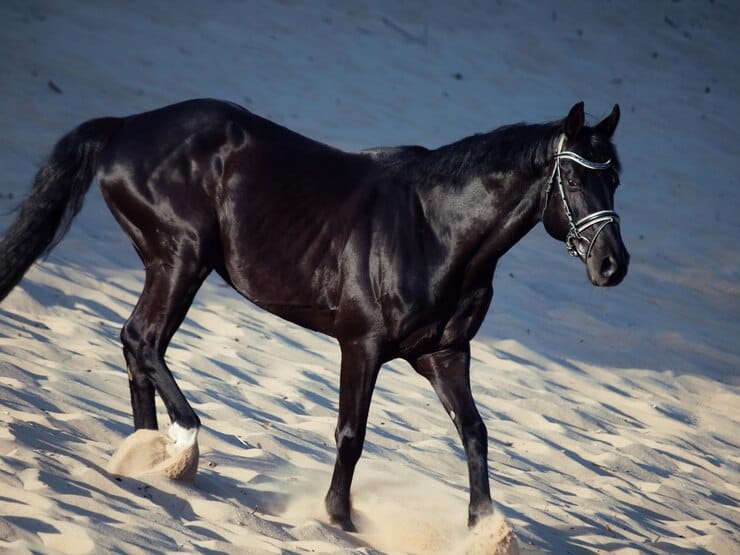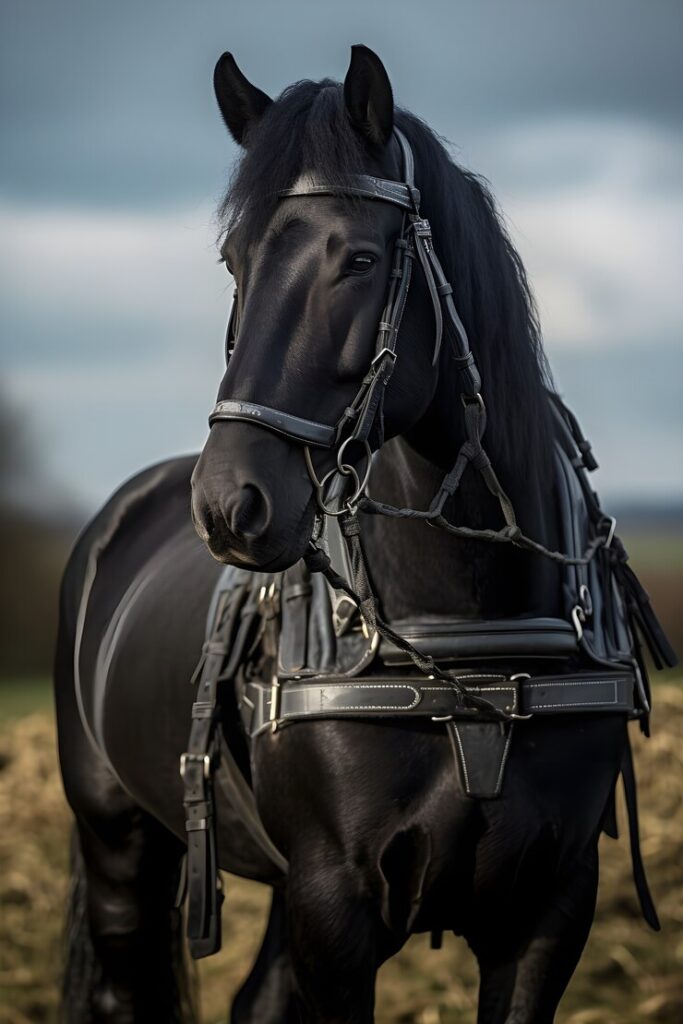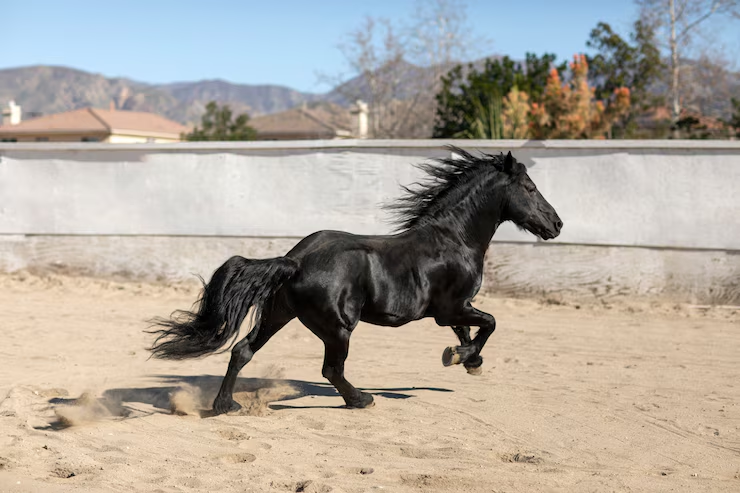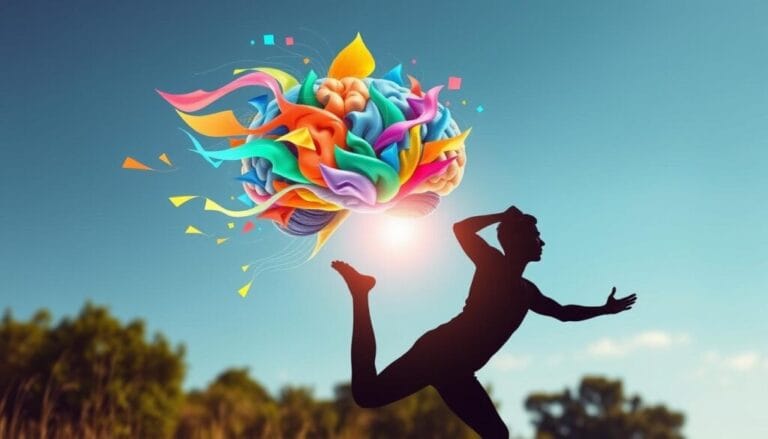THE MAJESTIC BLACK HORSE A Symbol of Power, Mystery, and Elegance N1

Table of Contents
The Black Horse: A Symbol of Mystery, Power, and Elegance
THE MAJESTIC BLACK HORSE has long been a symbol of both awe and intrigue throughout human history. With its sleek, dark coat and powerful presence, it often represents a combination of mystery, strength, and grace. These magnificent creatures have captivated the imagination of cultures around the world, featuring in folklore, mythology, and art across centuries. In this article, we will explore the significance of the black horse, its representation in various cultures, its role in modern society, and the attributes that make it so captivating.
The Physical Majesty of the Black Horse
One of the most striking aspects of the black horse is its appearance. The deep, jet-black coat of these animals creates a stunning contrast against lighter horses or the natural environment. Black horses are often seen as majestic and elegant, with their dark coat symbolizing power, authority, and elegance. The coat color is the result of genetics, with the black coloration primarily coming from the presence of the dominant black gene (E locus) in the horse’s DNA. Black horses can come in a variety of breeds, such as the Friesian, the Percheron, and the Kentucky Mountain Saddle Horse.
Black Horses in Mythology and Folklore
Throughout history, black horses have played a significant role in various mythologies and folklore. The color black is often associated with mystery, the unknown, and sometimes death or the afterlife. In ancient mythologies, black horses were frequently seen as powerful or supernatural beings. They were commonly linked to gods, kings, and warriors, embodying strength and resilience.
In Celtic folklore, black horses were considered to be mystical creatures, often appearing in the legends of the “Morrígan,” a Celtic goddess of war and fate. The Morrígan was said to ride a black horse into battle, symbolizing the harbinger of death. Similarly, in Norse mythology, the god Odin was often depicted riding a black horse, symbolizing his power and connection to the world of the dead and the afterlife.
In more recent folklore, black horses are sometimes associated with supernatural events or as omens of ill fate. The image of a black horse riding through misty landscapes or galloping through dark forests evokes a sense of foreboding and mystery.
The Black Horse in Art and Literature
The black horse has had a profound influence on art and literature throughout the ages. Its striking beauty and powerful symbolism have made it a frequent subject in paintings, sculptures, and written works. In literature, the black horse often appears as a companion to a heroic or tragic figure. It may also appear as a representation of freedom, strength, or the untamed spirit.
One of the most notable examples in literature is the iconic horse, “Black Beauty,” written by Anna Sewell. This classic novel, first published in 1877, follows the life of a black horse named Black Beauty, who experiences both the joys and cruelties of life in Victorian England. Through Black Beauty’s story, Sewell highlighted the mistreatment of horses and called for more humane treatment of animals. The novel remains one of the most beloved works of animal literature and continues to resonate with readers to this day.
In art, black horses are often depicted as symbols of grandeur and elegance. They have been immortalized by famous artists such as Leonardo da Vinci, who sketched a black horse as part of his designs for the Duke of Milan’s equestrian monument. The image of a black horse is also prevalent in the works of Romantic painters, where the horse often symbolizes freedom, untamed nature, and strength.

The Black Horse in Religious and Spiritual Symbolism
In many religious and spiritual traditions, the black horse holds deep symbolic meaning. The most famous reference is found in the Christian Bible, in the Book of Revelation, where four horsemen ride during the apocalypse. The rider of the black horse represents famine and scarcity, holding a pair of scales. This association with scarcity and the dire consequences of imbalance makes the black horse a powerful symbol of warning.
In contrast, in many spiritual and New Age beliefs, the black horse can symbolize the mystery of the unknown and the power to overcome adversity. Some believe that black horses carry an aura of strength and resilience, capable of navigating through difficult times with grace and power.
LEARN MORE : The 5 Best Personal Training Apps
Black Horses in the Modern World
In modern society, the black horse still holds cultural and symbolic significance, although its role has evolved. Today, black horses are often admired for their beauty and are seen in various equestrian competitions, such as dressage, jumping, and racing. The sleek, dark coats of black horses make them stand out, commanding attention as they perform in the arena.
Black horses are also frequently chosen for ceremonial purposes. In many cultures, black horses are used in processions, parades, and state events, adding a sense of grandeur and dignity to the occasion. Their elegant appearance and powerful presence make them ideal for such important roles.
In the world of horse racing, black horses have earned a special place as well. They are often seen as symbols of elite status due to their rarity and striking looks. Some famous black racehorses, such as the legendary “Black Caviar” from Australia, have achieved great success and are remembered as icons in the sport.
Black Horses in Popular Culture
In popular culture, the black horse continues to hold a unique place. Films, books, and television shows often feature black horses as symbols of heroism, strength, and the untamed spirit of nature. One of the most iconic examples is the 1993 film The Black Stallion, which tells the story of a young boy who befriends a wild black stallion. The horse becomes both a companion and a symbol of freedom for the boy, helping him to overcome personal challenges.
Similarly, the black horse appears in films and literature about the American West, often depicted as a companion to cowboys, symbolizing both the spirit of the frontier and the bond between humans and animals.
The Psychological Impact of the Black Horse
The psychological impact of seeing a black horse cannot be understated. For many, the image of a black horse evokes feelings of awe, mystery, and respect. The color black is often linked to the unknown and the subconscious, and seeing a black horse can evoke a sense of wonder or even fear. In some cases, it may represent an individual’s inner strength or the potential to overcome obstacles.
The black horse’s combination of mystery and majesty often inspires individuals to reflect on their own journeys or challenges. It serves as a reminder of the power of resilience and the grace that can be found even in the most difficult circumstances.
The Symbolism of the Black Horse Across Cultures
While the black horse is commonly associated with mystery and power in Western cultures, its symbolism varies widely across different cultures and traditions around the world. In many cases, the black horse is a symbol of transformation, death, and the connection between the physical and spiritual realms.
In Chinese culture, the black horse is often seen as a symbol of success and prosperity. The Chinese word for horse, “马” (mǎ), is associated with speed and ambition. Horses are traditionally seen as symbols of strength and endurance, and the black horse is often linked to achieving great things. In the Chinese zodiac, the year of the horse is considered auspicious, bringing good fortune to those born under its sign.
In African culture, particularly within the traditions of the Maasai and other tribes in East Africa, the black horse holds different meanings. It can represent sacredness, vitality, and a connection to the spiritual world. Among these communities, horses are revered as symbols of wealth, power, and status, and a black horse is seen as an especially valuable and noble animal.

The Black Horse in the Equestrian World
In the equestrian world, black horses stand out due to their rarity and striking beauty. The black horse is often the subject of admiration in both competitive and non-competitive settings. Their unique color makes them highly sought after for show jumping, dressage, and other disciplines. In equestrian competitions, black horses often seem to radiate a sense of majesty, making them a popular choice for riders seeking to make a strong impression.
Additionally, the black horse has become a popular choice in training and breeding programs for riders who seek horses with exceptional discipline and beauty. Breeders select for various attributes such as temperament, movement, and color, and the black coat is often viewed as a desirable trait that adds to the horse’s overall appeal.
The Role of the Black Horse in Historical Warfare
Throughout history, the black horse has often been associated with warriors and battle. Many cultures have employed horses as essential companions in combat, and the black horse has been linked to power and prestige. For example, during the medieval period, knights and soldiers who rode black horses were seen as formidable adversaries due to the striking visual impression these horses created on the battlefield.
In ancient history, black horses were sometimes used by ruling elites and military commanders to create an imposing and intimidating image. The horse itself became a status symbol of authority and dominance. Figures like Alexander the Great and Napoleon Bonaparte are often depicted with strong, regal horses, though many of these depictions often favor lighter-colored horses.
Black Horses in the Wild
Though horses are domesticated animals, wild black horses have occasionally been observed in remote regions. One of the most well-known wild populations is the “Kiger Mustang,” a breed of wild horse that roams in the western United States. While not all Kiger Mustangs are black, there have been some notable black individuals among the herd, reinforcing the myth of the wild black horse that embodies freedom and untamed spirit.
Additionally, the black horse is often romanticized in stories about wild horses that run free through open landscapes. These untamed black horses represent a sense of rebellion, untethered by human control. Their wild and free nature inspires people to embrace their own independence and strength.
The Black Horse in the Context of Modern Symbolism
In today’s context, the black horse continues to be a symbol of strength and power, but it also represents a deeper connection to the subconscious. Modern media, including films, literature, and advertising, frequently feature black horses to convey messages of resilience and mystery.
One notable example of the black horse in modern pop culture is the use of the horse in advertisements for luxury products. Brands that seek to convey a sense of sophistication, exclusivity, and raw power often use the image of a black horse in their campaigns. The sleek, dark figure of the black horse represents the epitome of elegance and wealth, adding an aura of mystery and allure.
Moreover, black horses continue to be seen as symbols of introspection and transformation. For example, in some forms of psychotherapy and self-development, horses—especially black horses—are used as part of equine-assisted therapy, where patients connect with the animal in order to better understand themselves. The black horse’s quiet strength and calm demeanor can serve as a powerful mirror for individuals seeking personal growth.
Famous Black Horses in History and Literature
Some of the most famous black horses in history and literature have achieved legendary status due to their role in shaping history or captivating readers’ imaginations. The most notable example is probably “Black Beauty,” the beloved horse from Anna Sewell’s novel. Black Beauty’s story is a poignant commentary on the humane treatment of animals and has become an iconic tale, both for children and adults.
Another famous black horse is the legendary racehorse Black Caviar, an Australian thoroughbred who retired undefeated. Black Caviar became a symbol of dominance in the racing world, embodying both physical perfection and untouchable greatness. The horse’s name, Black Caviar, perfectly captures the aura of exclusivity, strength, and elegance that the black horse represents in popular culture.
Another legendary black horse is Bucephalus, the horse of Alexander the Great. Known for his extraordinary loyalty and remarkable skills on the battlefield, Bucephalus was often depicted as a black or dark horse, symbolizing the strength of his rider and the power of their shared bond. Alexander’s legendary connection to Bucephalus has contributed to the ongoing association between black horses and supreme leadership.
Black Horses in the World of Fantasy and Science Fiction
In the realm of fantasy and science fiction, black horses often appear as symbols of the supernatural. From ghostly apparitions to mighty steeds of dark warriors, the black horse plays a critical role in many works of fiction. In J.R.R. Tolkien’s The Lord of the Rings, the Nazgûl, also known as the Ringwraiths, ride terrifying black horses. These horses, like their riders, embody darkness, fear, and death, making the black horse an important vehicle of malevolence in the story.
Similarly, in the Harry Potter series, the black horse appears in the form of the Thestrals—magical creatures that can only be seen by those who have witnessed death. These creatures, though initially unsettling, come to symbolize acceptance of mortality and the mystery of life beyond death. Thestrals are often depicted as black, linking them to the mystical and eerie connotations that black horses carry.
Conclusion: The Enduring Legacy of the Black Horse
The black horse remains one of the most powerful and enduring symbols in human history. Its deep, mysterious color, combined with its strength and grace, has led it to represent a wide array of emotions and concepts—from mystery and darkness to power and freedom. Throughout history, the black horse has been a companion to warriors, a hero in stories, a creature of awe and reverence, and a symbol of elegance and grace.
Whether in mythology, art, literature, or modern media, the black horse continues to inspire and captivate people around the world. It embodies resilience, beauty, and the untamed spirit, making it an iconic figure in our collective imagination.
Conclusion
The black horse is much more than a striking animal with a beautiful coat. It is a symbol of power, elegance, mystery, and grace, and has carried deep meanings across cultures, mythologies, and history. Whether appearing in folklore, art, literature, or modern society, the black horse continues to captivate the imagination of people around the world. Its role as a symbol of strength and resilience reminds us of the importance of overcoming adversity and embracing the unknown with courage and grace.






